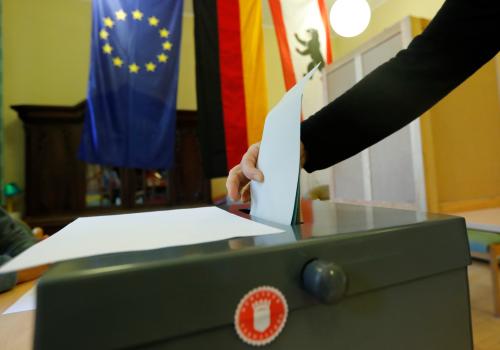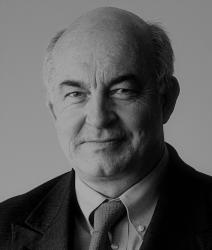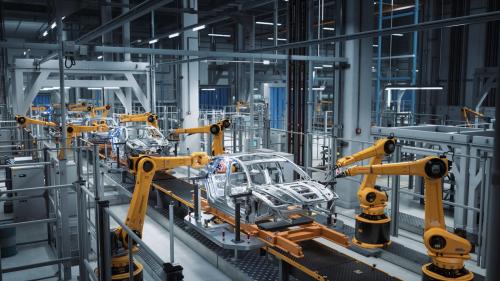This op-ed was originally published by Project Syndicate.
On May 23-26, voters across the European Union will go to the polls to elect members of the European Parliament. Much will be at stake. “Never, since World War II, has Europe been as essential,” French President Emmanuel Macron wrote recently, “yet never has Europe been in so much danger.”
Forces challenging the foundations of the European project are on the rise: Brexit supporters in the United Kingdom, populist governments in Central and Eastern Europe, and far-right parties in or near power virtually everywhere. Yet supporters of further European integration have been buoyed by the bold pronouncements of Macron, France’s most pro-European president in decades.
The upcoming elections will entrench the growing divide between those who want less Europe and those who want more. And the fragmented parliament that is likely to emerge will cast further uncertainty on the EU’s future direction. More generally, European politics seems ripe for a fundamental restructuring, with the long-standing division between center-left and center-right parties replaced by differences over the extent of further EU integration.
Those in favor of deeper integration also generally view globalization positively. True, they may not like the large inequalities and winner-take-all markets that globalization has brought. But they recognize the potential benefits of open markets and an open global economy, provided there is adequate regulation. And they believe that a more integrated Europe would have the necessary weight to make such regulation feasible.
Nationalists opposed to further EU integration, by contrast, also often resist globalization. They advocate returning to a more loosely integrated Europe of sovereign nation-states, and rolling back the activities and reach of European institutions. Some want no EU at all.
Yet although the divide between neo-nationalists and “Europeans” is probably the dominant fault line in these elections, the reality is more complicated. On the far right, for example, protectionists dominate, but there are also free traders who combine laissez-faire economics with virulent anti-immigrant sentiment.
Opinion polls suggest that anti-European and right-wing populist groups will together win about one-third of the parliament’s 751 seats. The center-right European People’s Party (EPP) and the center-left Progressive Alliance of Socialists and Democrats (S&D) could remain the two largest single blocs, but they will probably lose their current combined majority.
The centrist Alliance of Liberals and Democrats for Europe (ALDE) is likely to be the smallest bloc. But if, as seems likely, Macron’s La République En Marche ! decides to join it, ALDE could form an important group, with more than 13 percent of the seats. The Greens from various countries (above all Germany) will occupy the center and part of the left, together with the European United Left/Nordic Green Left.
Such an outcome will make it very hard to form stable alliances, and may complicate the process of electing the next president of the European Commission. The EPP, S&D, and ALDE will probably barely have a majority between them, and may not always vote together in any case.
Further eurozone integration should be the new parliament’s top priority. With Macron’s support, ALDE will probably take the lead in pushing for a eurozone budget and finance minister, and greater fiscal-policy coordination. The S&D would probably be ready to support some form of such integration, provided it has a strong social dimension—perhaps even eurozone unemployment insurance. But the EPP will be much harder to convince, and may oppose more integration, joining the rightist Euroskeptic parties.
Even if further eurozone integration is placed on the backburner for now, it is essential to the European project. The EU’s economic recovery is faltering, and a one-size-fits-all monetary policy cannot, and should not, be made to carry the entire burden of macroeconomic policy. The irrevocably fixed exchange rates created by the eurozone do not allow for national monetary policies, while significant fiscal-policy divergence would invite a crisis of the kind already experienced in the EU’s southern member states.
One must hope, therefore, that Macron revives the integration proposals he advanced at the start of his presidency and manages to convince German Chancellor Angela Merkel and the EPP to support him. Perhaps Merkel, who will not seek another term and may be thinking about her political legacy, will finally want to allow the eurozone to move forward.
Migration policy will be another challenge, because Euroskeptics will be joined by the East Europeans. The centrist parties will therefore have great difficulties finding and maintaining majorities, especially in view of the EPP’s suspension of Hungarian Prime Minister Viktor Orbán’s Fidesz party in March.
But for all of Europe’s problems and political fragmentation, the upcoming elections reflect the success of the European project: 28 countries (assuming the UK takes part) engaging in a cross-border election with pan-European parties, and already sharing a great deal of sovereignty. And, according to a European Commission Eurobarometer survey, 55 percent of European citizens believe that more decisions should be taken at the EU level.
In that respect, this month’s European elections are hugely encouraging. In a world threatened by the ghosts of extreme nationalism, they are a unique manifestation of the will to build a common future.
The Brookings Institution is committed to quality, independence, and impact.
We are supported by a diverse array of funders. In line with our values and policies, each Brookings publication represents the sole views of its author(s).





Commentary
Op-edMore or less Europe?
May 9, 2019